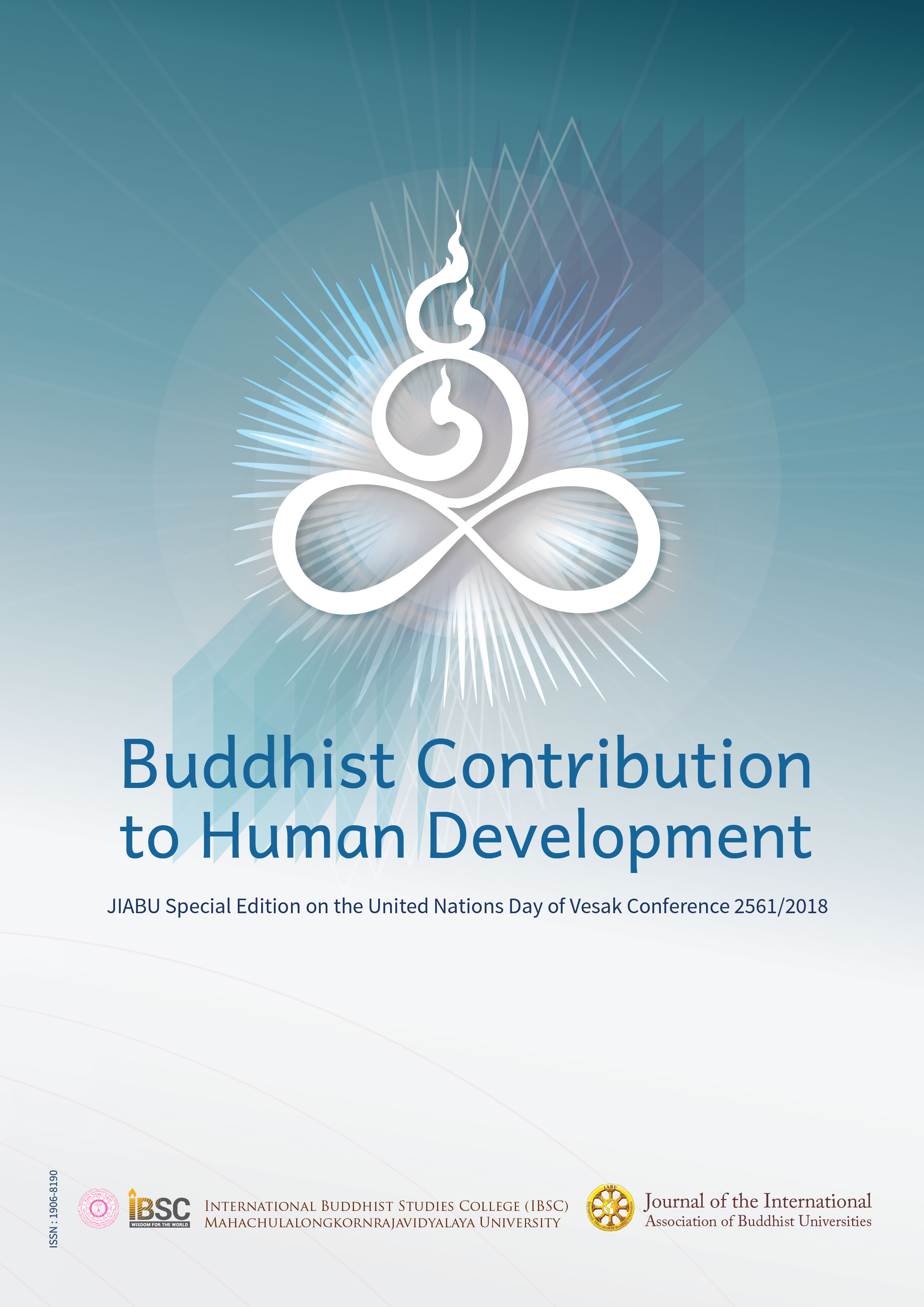Buddhism and Human Development: Buddhist Influenced Factors Enables Resilience in Adolescents
Main Article Content
Abstract
The teenage years are the times that are most susceptible to adaptation problems
as noticed by psychologists. Adaptation problems in the development of adolescents’
growth result in physical and mental health problems. Physical and mental health problems
of adolescents can be remedied by the applications of Buddhist influenced factors that
enable resilience. Buddhist influenced factors are sources or conditions for arising of the
right views which can facilitate resilience. Resilience is important because as positive
psychology explains it is the human capacity to face, overcome, and be strengthened by
(or even transformed by) the challenges of life. Therefore, Buddhism enables resilience in
adolescents’ physical and mental health development.
Article Details
Views and opinions expressed in the articles published by The Journal of the International Association of Buddhist Universities (JIABU), are of responsibility by such authors but not the editors and do not necessarily reflect those of the editors.
References
A.S. Masten, “Ordinary Magic: Resilience Process in Development,” American Psychologist, vol 56, no. 3 (March 2001): pp. 227-239.
Bhikkhu Bhodi, The Numerical Discourses of the Buddha: a translation of the Aṅguttara Nikāya/ translated from the Pāli by Bhikkhu Bodhi, (Wisdom Publications: USA, 2012), pp.178.
Bhikkhu Bodhi, The Middle Length Discourses of the Buddha: a new translation of the Majjhima Nikāya/ original translation by Bhikkhu Ñaṇmoli; translation edited and revised by Bhikkhu Bodhi, (Wisdom Publications: USA, 1995) p.390.
D.A. Pardini et al, “Religious faith and spirituality in substance abuse recovery: determining the mental health benefits,” Journal of Substance Abuse Treatment, vol. 19, no. 4 (December 2000): 347-354.
Edith Grotberg, A guide to Promoting Resilience in Children: Strengthening the Human spirit, (The Hague: The Bernard van Leer Foundation, 1995), p.10.
Erik Erikson, Identity: Youth and Crisis, New York: W. W. Norton Co, pp.
F. P. Julio Peres et al, “Spirituality and Resilience in Truma Victims,” Journal of Religion and Health, vol 46, no. 3 (September 2007): 343-350.
G.E. Richardson, “The Metatheory of Resilience and Resiliency,” Journal of Clinical Psychology, vol 58, no 3 (March 2002): 307-321.
Gordon R. Lowe, The Growth of Personality: from Infancy to Old Age, Great Britain: Cox & Wyman Ltd. 1972, pp.150.
Grotberg. E.H. “A guide to promoting resilience in children: Strengthening the Human spirit”. The international resilience project. The Hague: The Bernard van Leer Foundation, 1995.
Ibid., p. 390.
James Marcia, Identity Development - Aspects of Identity, Child Development Reference - Vol 4.
Jamie Stang and Mary Story, “Adolescent Growth and Development”, viewed 6 March 2018,
Julia Aegerter, Resilience: What’s Buddhism Got to Do with It? (USA: Upaya Zen Center, 2012), p. 21.
M.I.294.
M.M. Tugade and B.L. Fredrickson, “Resilient Individuals Use Positive Emotions to Bounce Back from Negative Emotional Experiences,” Journal of Personality and Social Psychology, vol 86, no. 2 (February 2004): pp. 320-333.
Punnada Sulaiman, M.D, “Understanding, Diagnosing, and Preventing”, viewed 6 March 2018,
S.C. Kobasa, “Stressful Life Events, Personality and Health: An Inquiry into Hardiness,” Journal of Personality and Social Psychology, vol 37, no. 1 (January1979): pp. 1-11.
S.R. Maddi and D.M. Khoshaba, Resilience at Work: How to Succeed No Matter What Life Throws at You, (New York: Amacom, 2005), p. 2.
Sandra Prince-Embury and Donald H Saklofske, Resilience in Children, Adolescents, and Adults: Translating Research into Practice, (New York: Springer Science+Business Media, 2013), p. 3.
Terry Faw and Gary S. Belken, Child Psychology, Singapore: McGraw-Hill Book Co., pp.411.
Terry Faw and Gary S. Belken, Child Psychology, Singapore: McGraw-Hill Book Co., pp.414.
Terry Faw and Gary S. Belken, Child Psychology, Singapore: McGraw-Hill Book Co., pp.435.
Terry Faw and Gary S. Belken, Child Psychology, Singapore: McGraw-Hill Book Co., pp.436.


